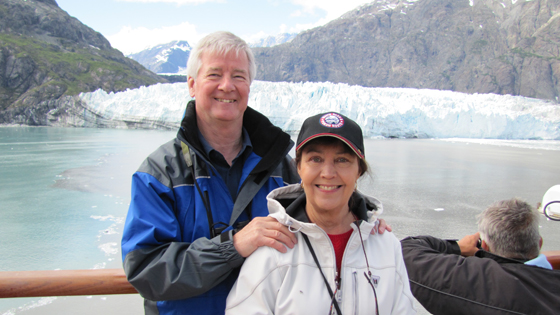
Larry and Evelyn Bryan on their Alaskan cruise in 2010. (Photo: Larry Bryan)
For some couples, third time's the charm.
That's true for Larry and Evelyn Bryan, who met more than 25 years ago working for the same company. She was in product development, he in engineering support. Each had been married twice before.
They fell in love, married in 1989 and settled in the Beaches neighbourhood of Toronto, both with children they adored from previous marriages.
It was a modern day love story.
All that changed in February 2013 when they learned Evelyn had cervical cancer. It was stage four. The cancer had spread.
"I remember asking the nurse 'Is it treatable?'" says Larry. "And, the nurse asked my wife, 'Do you want to know?' to which she replied 'No', and that was the end of the conversation.
"You realize quickly that the person with cancer and the caregiver supporting them aren't always ready to have the same kinds of conversations."
Related to this story
Evelyn was soon referred to Princess Margaret Cancer Centre to begin a clinical trial, although after four short weeks, it became clear the treatment wasn't working.
"That's when it started to sink in," says Larry. "Both Evelyn and I began to accept an inevitable fate – and we needed to start planning."
"Tough conversations were ahead of us."
The other side of cancer: The emotional toll
Advanced cancer brings extensive physical and psychosocial challenges that may contribute to emotional distress, anxiety and diminished well-being for both patients and their caregivers.
Managing Cancer And Living Meaningfully (CALM) is a psychosocial intervention developed by Drs. Gary Rodin, Department Head, and Sarah Hales, Coordinator of Psychiatry Services in the Department of Psychosocial Oncology and Palliative Care (POPC), at the Princess Margaret. The goal is to help patients with life-threatening cancer, and their caregivers, manage the practical and profound problems associated with advanced disease. Together with Dr. Chris Lo, Research Psychologist, UHN, they are conducting research on its effectiveness funded by the Canadian Institutes of Health Research.
Dr. Gary Rodin, Department Head, Psychosocial Oncology and Palliative Care at the Princess Margaret. (Photo: The Princess Margaret Cancer Foundation)
CALM consists of six individual sessions over a three to six-month period with specially trained therapists drawn from a variety of disciplines. The program addresses four main areas:
- Symptom control and communication with health-care providers;
- Self-concept and relations with close others;
- Spiritual well-being and the values and beliefs that provide meaning and purpose in life;
- Preparing for the future, sustaining hope and facing mortality.
"At the Princess Margaret, we try to have psychosocial and palliative care highly integrated into cancer care so that patients and families have time to engage in sensitive and difficult conversations and to plan for what lies ahead," says Dr. Rodin. "Research has shown that spouses can be significantly more depressed than the patient.
"CALM offers couples a safe space to discuss how they're feeling and plan for the future."
Dr. Rodin is also the Director of the
Global Institute of Psychosocial, Palliative and End-of-Life Care (GIPPEC), a newly launched University of Toronto Global Institute with a home base at the Princess Margaret. GIPPEC will bring together a diverse group of experts from across Toronto and around the world to ensure timely access to palliative and end-of-life care on a global scale.
The aim is to develop interdisciplinary research and education – and to disseminate findings to ensure timely access to psychosocial and palliative care for individuals and their families facing life-threatening and advanced disease.
"I have a newfound respect for palliative care," says Larry. "Before this experience, it meant nothing to me, I didn't even know what it was."
Katrina MacAlpine, Project manager, GIPPEC, says the Institute will also help dispel myths around death and dying and open up the conversation among patients, family members and healthcare providers.
"It's about providing families with the right tools so they can ask the right questions," says Katrina. "Having conversations earlier on when patients are in a better frame of mind can ensure your loved one's wishes are known ahead of time.
"This removes the burden from family members after the fact."
Larry continues to see Dr. Rodin for bereavement sessions. He hopes to become a volunteer at the Princess Margaret to help other patients cope with the emotional burden of cancer. (Photo: UHN)
Evelyn's final weeks
Larry remembers the final weeks of Evelyn's life. The fear of losing the woman he spent so many years of his life protecting. The final evenings he stayed overnight at the hospital so she wouldn't be alone.
While Evelyn and Larry only made it to one CALM session before Evelyn died on Sept. 5 2013, only seven months after her diagnosis, Larry says the session with Dr. Rodin was a game-changer.
"It's important to get the help of a third party because it's difficult to express everything you're feeling to your spouse – especially when you're both holding on to the best-case scenario, even if it's the worst-case scenario."
Since Evelyn's passing, Larry has continued to see Dr. Rodin for bereavement sessions to talk openly about his loss and how he's feeling.
"Sometimes it feels like a short time ago, and sometimes it feels like a long time has passed," says Larry. "Dr. Rodin helps me understand how I'm coping during this transition period."
Larry has been inspired by the work being done in psychosocial oncology and palliative care at the Princess Margaret and hopes to become a
Healing Beyond the Body volunteer (HBB). HBB volunteers are specially trained to work with cancer patients and their supporters, helping them to cope with the psychological, emotional, practical and social aspects of cancer.
"I've been working since I was 19 so pretty soon I'll need to start thinking of my life beyond work," says Larry. "Volunteering is something I've always thought about.
"Spending my time helping other patients at the Princess Margaret would be very fulfilling."
